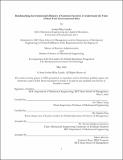Benchmarking environmental efficiency of garment factories to understand the value of real-time environmental data
Author(s)
Landis, Jordan Riley.
Download1191623548-MIT.pdf (3.631Mb)
Other Contributors
Sloan School of Management.
Massachusetts Institute of Technology. Department of Mechanical Engineering.
Leaders for Global Operations Program.
Advisor
Maria Yang and Charles Fine.
Terms of use
Metadata
Show full item recordAbstract
Li & Fung works with over 10,000 factories distributed across 50 countries to design, produce, and deliver hard- and soft- goods to over 2,000 apparel and consumer goods customers. An increasingly prevalent focus of the industry, driven both by regulation and consumer preferences, is to measure, benchmark, and reduce the overall environmental impact of the supply chain. Currently the measurement mechanisms in place rely on a traditional two-phase approach involving factory self-reporting and verification via independent audits. The scope of this project is to assess the efficacy of currently available measurement data in order to inform the requirements for real-time collected data. This project will be broken into four phases. First, existing industry data sources will be described and evaluated in order to assess data quality, understand requirements, and provide recommendations for future data collection. Second, the features of the data will be analyzed in order to develop an understanding of the underlining relationships. Third, using a set of selected features from the second phase, a predictive clustering algorithm for factory-level resource efficiency will be developed and used to benchmark factories. Finally, an analysis will be performed to evaluate the requirements of real time data and how real-time data could improve the benchmarking tool and future tools and services.
Description
Thesis: M.B.A., Massachusetts Institute of Technology, Sloan School of Management, in conjunction with the Leaders for Global Operations Program at MIT, May, 2020 Thesis: S.M., Massachusetts Institute of Technology, Department of Mechanical Engineering, in conjunction with the Leaders for Global Operations Program at MIT, May, 2020 Cataloged from the official PDF of thesis. Includes bibliographical references (pages 84-86).
Date issued
2020Department
Sloan School of Management; Massachusetts Institute of Technology. Department of Mechanical Engineering; Leaders for Global Operations ProgramPublisher
Massachusetts Institute of Technology
Keywords
Sloan School of Management., Mechanical Engineering., Leaders for Global Operations Program.